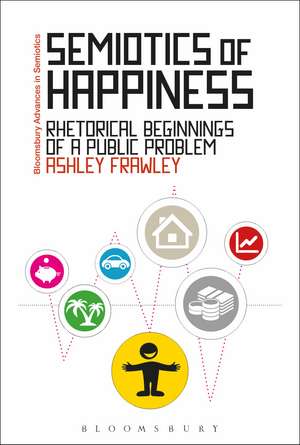Semiotics of Happiness: Rhetorical beginnings of a public problem: Bloomsbury Advances in Semiotics
Autor Ashley Frawleyen Limba Engleză Hardback – 25 feb 2015
| Toate formatele și edițiile | Preț | Express |
|---|---|---|
| Paperback (1) | 256.85 lei 6-8 săpt. | |
| Bloomsbury Publishing – 24 aug 2016 | 256.85 lei 6-8 săpt. | |
| Hardback (1) | 773.65 lei 3-5 săpt. | |
| Bloomsbury Publishing – 25 feb 2015 | 773.65 lei 3-5 săpt. |
Din seria Bloomsbury Advances in Semiotics
- 14%
 Preț: 179.13 lei
Preț: 179.13 lei - 22%
 Preț: 271.40 lei
Preț: 271.40 lei - 22%
 Preț: 256.85 lei
Preț: 256.85 lei -
 Preț: 173.71 lei
Preț: 173.71 lei - 18%
 Preț: 238.84 lei
Preț: 238.84 lei - 30%
 Preț: 568.71 lei
Preț: 568.71 lei - 14%
 Preț: 171.77 lei
Preț: 171.77 lei - 14%
 Preț: 1006.79 lei
Preț: 1006.79 lei - 23%
 Preț: 190.96 lei
Preț: 190.96 lei - 23%
 Preț: 198.05 lei
Preț: 198.05 lei - 13%
 Preț: 231.16 lei
Preț: 231.16 lei -
 Preț: 198.22 lei
Preț: 198.22 lei - 13%
 Preț: 232.07 lei
Preț: 232.07 lei - 13%
 Preț: 237.28 lei
Preț: 237.28 lei - 13%
 Preț: 258.42 lei
Preț: 258.42 lei - 24%
 Preț: 190.16 lei
Preț: 190.16 lei - 8%
 Preț: 299.19 lei
Preț: 299.19 lei - 23%
 Preț: 192.30 lei
Preț: 192.30 lei - 18%
 Preț: 306.47 lei
Preț: 306.47 lei - 22%
 Preț: 257.32 lei
Preț: 257.32 lei - 22%
 Preț: 223.58 lei
Preț: 223.58 lei - 30%
 Preț: 773.39 lei
Preț: 773.39 lei - 22%
 Preț: 226.79 lei
Preț: 226.79 lei - 22%
 Preț: 238.40 lei
Preț: 238.40 lei - 23%
 Preț: 192.73 lei
Preț: 192.73 lei - 22%
 Preț: 237.84 lei
Preț: 237.84 lei - 22%
 Preț: 1007.62 lei
Preț: 1007.62 lei - 8%
 Preț: 131.83 lei
Preț: 131.83 lei - 18%
 Preț: 305.53 lei
Preț: 305.53 lei
Preț: 773.65 lei
Preț vechi: 1112.82 lei
-30% Nou
Puncte Express: 1160
Preț estimativ în valută:
148.03€ • 154.56$ • 122.52£
148.03€ • 154.56$ • 122.52£
Carte disponibilă
Livrare economică 14-28 martie
Preluare comenzi: 021 569.72.76
Specificații
ISBN-13: 9781472523716
ISBN-10: 1472523717
Pagini: 240
Dimensiuni: 156 x 234 x 14 mm
Greutate: 0.51 kg
Editura: Bloomsbury Publishing
Colecția Bloomsbury Academic
Seria Bloomsbury Advances in Semiotics
Locul publicării:London, United Kingdom
ISBN-10: 1472523717
Pagini: 240
Dimensiuni: 156 x 234 x 14 mm
Greutate: 0.51 kg
Editura: Bloomsbury Publishing
Colecția Bloomsbury Academic
Seria Bloomsbury Advances in Semiotics
Locul publicării:London, United Kingdom
Caracteristici
Puts the current debate about happiness into historical context, tracing its roots to Ancient Greece
Notă biografică
Ashley Frawley, Lecturer in Sociology and Social Policy, Swansea University, Wales
Cuprins
PrefaceAcknowledgements1. The 'Problem' of Happiness2. A Hospitable Context for Claims-Making 3. The Rhetoric of Social Problems4. Claims-Makers and the News5. Happiness: From Prehistory to Paradox6. The Problem of Lies Within7. Owning Happiness8. Happiness Expertise9. The Rhetoric of Happiness 10. The Inventory of a ProblemBibliographyIndex
Recenzii
Of interest to linguists and sociologists alike, this excellent study examines when, how, and why the discourse of happiness came to find a place in British public policy. Documenting the growth of the happiness industry in Britain over the last 25 years, Frawley (sociology and social policy, Swansea Univ., Wales) details the expansion of media and political commentary on collective well-being . This book is valuable both as a history of the rise of happiness discourse and research and as an exemplary discussion of the processes involved in the social construction of a problem by key players with financial and social interests at stake. Going beyond the simple documentation of the context, players, and processes involved in the rise of a common cultural symbol, Frawley argues that this problematization of an evocative emotion is directly related to people's loss of belief in progress, collective narratives, and structural solutions. Summing Up: Recommended. Upper-division undergraduates through faculty and professionals.
A clever, careful dissection of contemporary claims by experts, politicians, and the media that modern societies have a happiness problem. What can I say? This book made me happy.
Ashley Frawley provides a compelling account of the social and political developments that have seen the issue of 'happiness' become a key focus of contemporary social policy. She charts the way in which we now conceptualise a wide range of social problems via the language of happiness and unhappiness. In an intelligent and persuasive manner she alerts us to the need to view the 'happiness agenda' as ultimately being conservative in nature, containing as it does an implicit critique of change, whereby the achievement of psychological equality is presented as a radical alternative to material advancement. Frawley's critique should encourage us to question such a lowering of both individual and societal expectations and she provides us with an intellectual resource with which to do so.
Amidst a deluge of uncritical outpourings from the media, policy makers and psychologists about the supposedly dire state of the nation's happiness, Ashley Frawley's book offers a forensic analysis of how a self-serving happiness and well-being industry has come to dominate British public policy and debate over the past 20 years. It's an indispensable read for anyone wanting to understand these far-reaching and serious developments.
The original and provocative insights in Ashley Frawley's Semiotics of Happiness illuminate how the happiness and wellbeing industry is suffused with a 'morality of low expectations' ... Frawley charts in forensic detail the speed with which happiness has been recast as a social problem
Of interest to linguists and sociologists alike, this excellent study examines when, how, and why the discourse of happiness came to find a place in British public policy. Documenting the growth of the happiness industry in Britain over the last 25 years, Frawley (sociology and social policy, Swansea Univ., Wales) details the expansion of media and political commentary on collective well-being. She argues that modern insider "claims-makers," with the aid of the "expert" and the scientist, helped move happiness, with even more speed, into the public realm after 2003 and into discussions of national public policy. This culminated in political change with the establishment, in 2010, of Britain's Measuring National Well-Being program. This book is valuable both as a history of the rise of happiness discourse and research and as an exemplary discussion of the processes involved in the social construction of a problem by key players with financial and social interests at stake. Going beyond the simple documentation of the context, players, and processes involved in the rise of a common cultural symbol, Frawley argues that this problematization of an evocative emotion is directly related to people's loss of belief in progress, collective narratives, and structural solutions.
A clever, careful dissection of contemporary claims by experts, politicians, and the media that modern societies have a happiness problem. What can I say? This book made me happy.
Ashley Frawley provides a compelling account of the social and political developments that have seen the issue of 'happiness' become a key focus of contemporary social policy. She charts the way in which we now conceptualise a wide range of social problems via the language of happiness and unhappiness. In an intelligent and persuasive manner she alerts us to the need to view the 'happiness agenda' as ultimately being conservative in nature, containing as it does an implicit critique of change, whereby the achievement of psychological equality is presented as a radical alternative to material advancement. Frawley's critique should encourage us to question such a lowering of both individual and societal expectations and she provides us with an intellectual resource with which to do so.
Amidst a deluge of uncritical outpourings from the media, policy makers and psychologists about the supposedly dire state of the nation's happiness, Ashley Frawley's book offers a forensic analysis of how a self-serving happiness and well-being industry has come to dominate British public policy and debate over the past 20 years. It's an indispensable read for anyone wanting to understand these far-reaching and serious developments.
The original and provocative insights in Ashley Frawley's Semiotics of Happiness illuminate how the happiness and wellbeing industry is suffused with a 'morality of low expectations' ... Frawley charts in forensic detail the speed with which happiness has been recast as a social problem
Of interest to linguists and sociologists alike, this excellent study examines when, how, and why the discourse of happiness came to find a place in British public policy. Documenting the growth of the happiness industry in Britain over the last 25 years, Frawley (sociology and social policy, Swansea Univ., Wales) details the expansion of media and political commentary on collective well-being. She argues that modern insider "claims-makers," with the aid of the "expert" and the scientist, helped move happiness, with even more speed, into the public realm after 2003 and into discussions of national public policy. This culminated in political change with the establishment, in 2010, of Britain's Measuring National Well-Being program. This book is valuable both as a history of the rise of happiness discourse and research and as an exemplary discussion of the processes involved in the social construction of a problem by key players with financial and social interests at stake. Going beyond the simple documentation of the context, players, and processes involved in the rise of a common cultural symbol, Frawley argues that this problematization of an evocative emotion is directly related to people's loss of belief in progress, collective narratives, and structural solutions.








